

A Guide to Recommender Systems. We're running a special series on recommendation technologies and in this post we look at the different approaches - including a look at how Amazon and Google use recommendations.
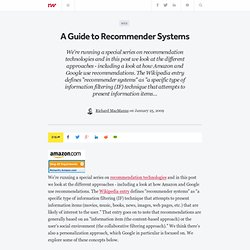
The Wikipedia entry defines "recommender systems" as "a specific type of information filtering (IF) technique that attempts to present information items (movies, music, books, news, images, web pages, etc.) that are likely of interest to the user. " That entry goes on to note that recommendations are generally based on an "information item (the content-based approach) or the user's social environment (the collaborative filtering approach).
" We think there's also a personalization approach, which Google in particular is focused on. We explore some of these concepts below. Recommender Systems - past, present, and future. Open source recommendation engine. Machine learning. The Filter Bubble. Eli Pariser: Beware online "filter bubbles". Are we stuck in filter bubbles? Here are five potential paths out. The filter bubble is a name for an anxiety — the worry that our personalized interfaces to the Internet will end up telling us only what we want to hear, hiding everything unpleasant but important.
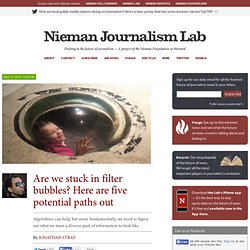
It’s a fabulous topic of debate, because it’s both significant and marvelously ill-defined. But to get beyond arguing, we’re going to need to actually do something. I have five proposals. If you’re not familiar with the filter bubble argument, start with Eli Pariser’s TED talk. The basic idea is this: All of us now depend on algorithmic personalization and recommendation, such as Google’s personalized results and the Facebook news feed which decides for us whose updates we see.
Or maybe not. People have been talking about the dangers of personalized algorithmic filters since the dawn of the web — here’s Jaron Lanier in 1995, and Cass Sunstein in 2002 — and we’re still talking about it. 1. When we look at how people interact on the web, what do we actually see? 2. 3. 4. Système de recommandation. Un article de Wikipédia, l'encyclopédie libre.
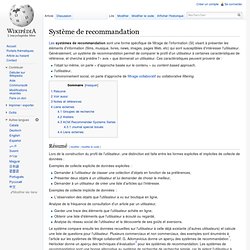
5 Problems of Recommender Systems. Earlier this week we posted a Guide to Recommender Systems, as part of our series on recommendation technologies.

In this post we look at some of the challenges in building or deploying a recommender system. And yes, Napoleon Dynamite is one of them. This week an event called Recked was held in Amsterdam, aimed at engineers interested in these systems. How to Burst the "Filter Bubble" that Protects Us from Opposing Views. The term “filter bubble” entered the public domain back in 2011when the internet activist Eli Pariser coined it to refer to the way recommendation engines shield people from certain aspects of the real world.
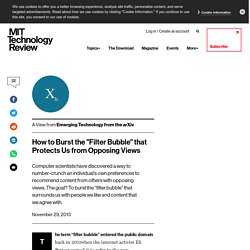
Pariser used the example of two people who googled the term “BP”. One received links to investment news about BP while the other received links to the Deepwater Horizon oil spill, presumably as a result of some recommendation algorithm. This is an insidious problem. Recommender system. Recommender systems or recommendation systems (sometimes replacing "system" with a synonym such as platform or engine) are a subclass of information filtering system that seek to predict the 'rating' or 'preference' that user would give to an item.[1][2] Recommender systems have become extremely common in recent years, and are applied in a variety of applications.
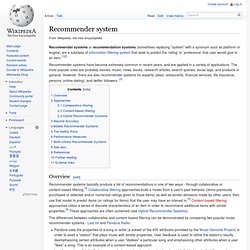
The most popular ones are probably movies, music, news, books, research articles, search queries, social tags, and products in general. Recommender Systems Resource Center. Welcome to the Recommender Systems Resource Center.
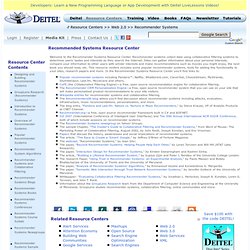
Recommender systems collect data using collaborative filtering systems to determine users' tastes and interests as they search the Internet. Sites can gather information about your personal interests, compare your information to other users with similar interests and make recommendations such as movies you might enjoy, the next book you should read, etc. This resource centers includes some popular recommender systems, tools for adding this functionality to your sites, research papers and more. Personalization. Personalization involves using technology to accommodate the differences between individuals.
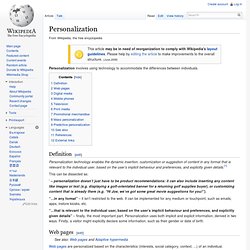
Definition[edit] Personalization technology enables the dynamic insertion, customization or suggestion of content in any format that is relevant to the individual user, based on the user’s implicit behaviour and preferences, and explicitly given details.[1] This can be dissected as: ' – personalization doesn’t just have to be product recommendations: it can also include inserting any content like images or text (e.g. displaying a golf-orientated banner for a returning golf supplies buyer), or customizing content that is already there (e.g. Personalization Technology: An Online Personalization Engine. Personalization Technologies: A Primer. Jack Aaronson | August 24, 2007 | 0 Comments inShare0 A brief rundown of the most common personalization technologies, what they're normally used for, and the pros and cons associated with them.

Five years ago, I wrote a lot about personalization. Let's return to the topic to look at personalization technologies. The landscape has changed so much in the last few years that finding technology companies that just make products centered around these technologies is often difficult. When the Internet Thinks It Knows You.